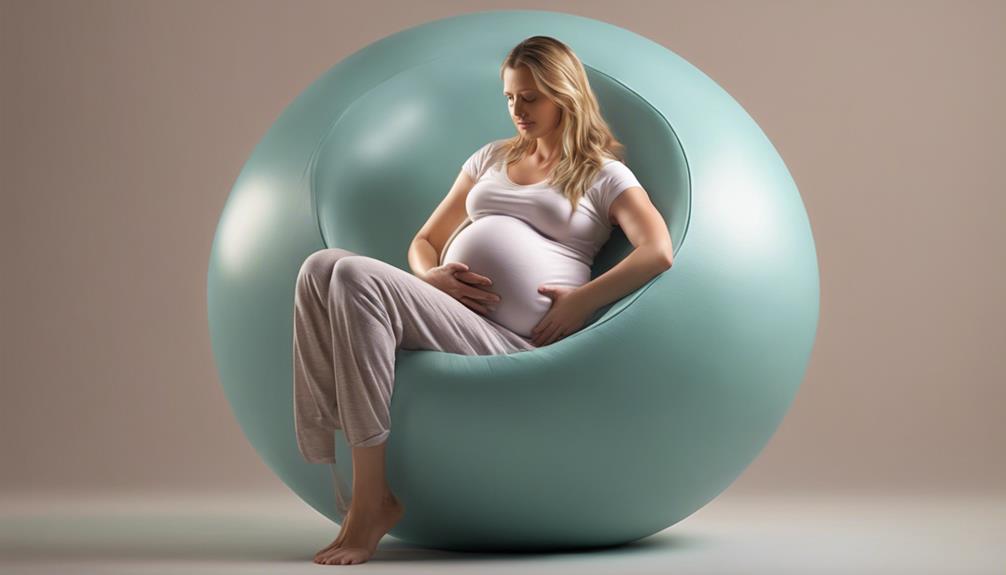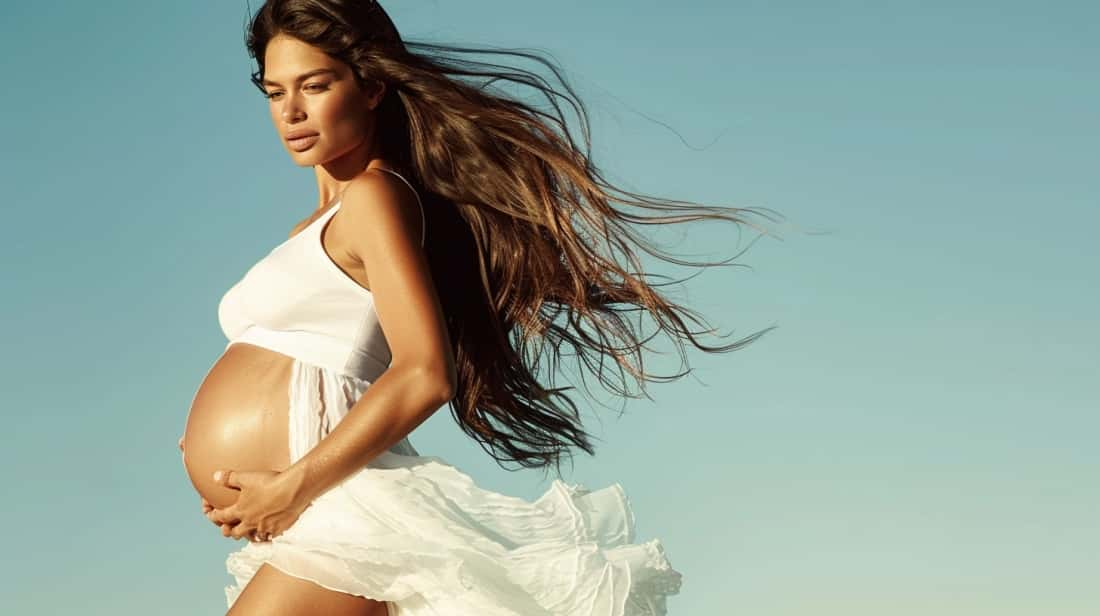Have you ever thought about the most effective methods to protect yourself and your unborn child from possible harm if you fall during the third trimester of pregnancy? It’s widely understood how crucial maintaining safety is, particularly in such a sensitive period.
But what specific steps can we take to guarantee our well-being in case of a fall? Let's explore some practical tips that could make a significant difference in keeping both you and your little one safe during this critical period.
Key Takeaways
- Wear proper footwear with slip-resistant soles for stability and reduced fall risks.
- Strengthen core muscles through exercises to enhance balance and stability.
- Stay hydrated to support circulation, prevent dizziness, and maintain well-being.
- Be mindful of surroundings, seek assistance if needed, and use handrails for support.
Importance of Balance
Maintaining good balance in the third trimester is essential for preventing falls and ensuring the safety of both the mother and baby. As the body undergoes significant changes during pregnancy, the risk of falls and injuries can increase. Strong core muscles, along with thigh and hip strength, are vital for supporting balance in this stage. These muscles provide stability and help in maintaining proper posture, reducing the chances of accidents. Engaging in balance exercises regularly can enhance stability and coordination, making it easier to navigate daily activities without compromising safety.
Pregnant individuals must prioritize their balance to safeguard themselves and their growing baby. By focusing on strengthening core muscles and practicing good posture, the risk of falls in the third trimester can be minimized. Taking proactive steps to improve balance not only reduces the likelihood of injuries but also promotes overall well-being during this critical phase of pregnancy.
Proper Footwear

When it comes to staying safe and stable during the third trimester, the shoes we choose play an essential role. Opting for shoes with proper support, slip-resistant soles, and a comfortable fit is necessary in minimizing the risk of falls.
Prioritizing safety and selecting the right footwear can greatly contribute to maintaining balance and preventing accidents during pregnancy.
Shoe Support Importance
Choosing supportive footwear with good arch support is essential for maintaining stability and balance during the third trimester of pregnancy. Proper footwear can help alleviate discomfort and reduce the risk of falls by providing the necessary support for your changing body.
Shoes with adequate support not only help with balance but also aid in shock absorption, lessening the impact on your joints as you carry the extra weight of pregnancy. Opting for shoes with non-slip soles can further enhance stability and prevent any accidental slips or falls.
Additionally, avoiding high heels and choosing flat, supportive shoes can prevent strain on your feet and ankles, promoting overall comfort and well-being during this critical time.
Slip-Resistant Soles
To enhance stability and prevent potential falls during pregnancy, opt for footwear featuring slip-resistant soles. Slip-resistant soles offer better traction, reducing the risk of accidental slips and falls, especially in the third trimester. These soles provide added stability and support, essential for maintaining balance as your body changes. When choosing shoes with slip-resistant soles, look for designs that offer good grip on various surfaces to minimize the chances of slipping. Here is a table highlighting the importance of slip-resistant soles in pregnancy footwear:
| Benefit | Description | Example |
|---|---|---|
| Enhanced Traction | Reduces the risk of slipping on slippery surfaces | Textured rubber soles |
| Improved Stability | Helps in maintaining balance and preventing falls | Wide base for better support |
| Injury Prevention | Minimizes the chances of potential injuries during pregnancy | Shock-absorbing cushioning |
Choosing footwear with slip-resistant soles can significantly enhance your safety and comfort during the third trimester.
Comfortable Fit Essential
For pregnant individuals in the third trimester, ensuring a comfortable fit in footwear is important for maintaining balance and stability to prevent slips and falls. Opting for comfortable shoes with proper arch support is critical during this stage of pregnancy to alleviate pressure on the feet and provide adequate support.
It's important to prioritize stability over style and choose footwear with good grip to prevent accidents. Avoiding high heels or wedges can greatly reduce the risk of losing balance while walking. Supportive footwear not only enhances balance but also offers better traction on various surfaces, decreasing the likelihood of falls.
Selecting shoes that offer cushioning and arch support can help minimize foot fatigue and discomfort, promoting a safer and more stable walking experience.
Mindful Movement

Staying mindful of our body's position and movements is essential in the third trimester of pregnancy to prevent falls and guarantee safety for both mom and baby. Mindful movement involves focusing on maintaining good posture and balance throughout daily activities.
By engaging in exercises like prenatal yoga or swimming, we can enhance our strength and flexibility, ultimately improving stability. It's important to steer clear of sudden or jerky motions that could disrupt our balance and potentially lead to falls.
Instead, we should practice deep breathing techniques to stay calm and centered, fostering better body awareness and coordination. Being mindful of how we move not only reduces the risk of accidents but also supports our overall well-being during this important stage of pregnancy.
Utilize Handrails
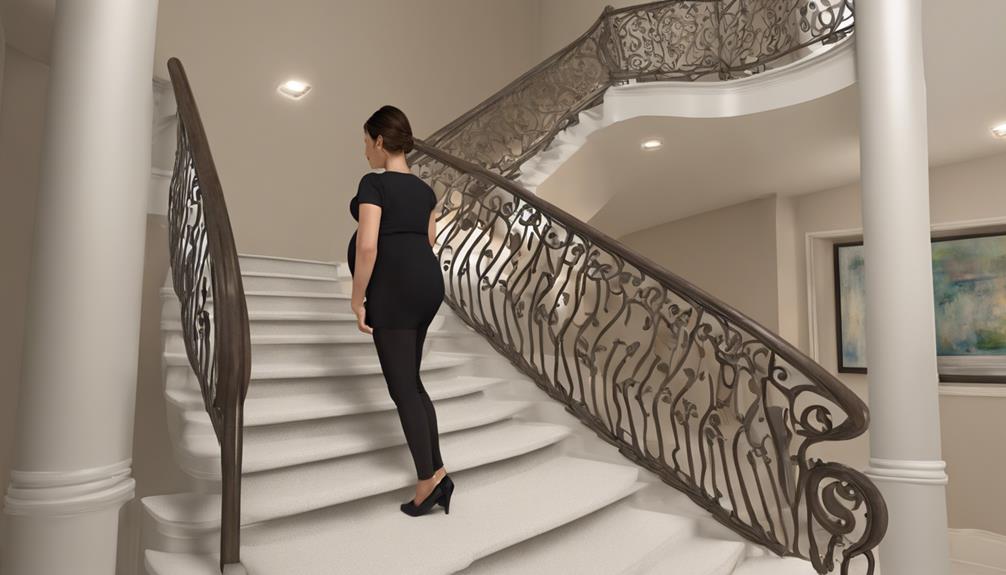
Traversing the obstacles of the third trimester with grace and safety often involves depending on handrails for added stability, particularly in areas with stairs or uneven surfaces. Handrails are a critical source of support for pregnant women in their third trimester, aiding in maintaining balance and preventing falls. Here are some key reasons why utilizing handrails is essential:
- Support and Stability: Handrails provide essential support and stability, especially when moving through stairs or uneven surfaces.
- Prevent Falls: Using handrails can help prevent falls by offering a secure grip for balance and reducing the risk of accidents.
- Safety Measures: Pregnant individuals should always hold onto handrails when available to make safety and prevent potential injuries.
- Public Places: Handrails are especially beneficial in public places or areas with high foot traffic to aid in maintaining balance.
- Decrease Likelihood of Accidents: Proper utilization of handrails can notably lessen the likelihood of slips, trips, and falls for pregnant women in their third trimester.
Avoid Rushing

Let's remember to take it easy and avoid rushing, especially during the third trimester when balance can be more challenging.
By moving slowly and deliberately, we can better maintain control and prevent accidents.
Being mindful of our steps and surroundings will help us prioritize safety and reduce the risk of falling.
Slow Movement Approach
Slowing down and moving deliberately can greatly reduce the risk of losing balance and falling during the third trimester of pregnancy. Here are some tips to help you navigate this delicate stage safely:
- Walk at a slower pace to maintain better control over your body.
- Avoid sudden movements or quick changes in direction to prevent accidents.
- Take your time and move with caution to protect yourself and your baby.
- Prioritize safety by being mindful of your surroundings.
- Moving slowly can help you avoid tripping or slipping, ensuring a safer experience for you and your little one.
Mindful Step Placement
Mindfully placing each step and avoiding rushing is essential for maintaining balance and preventing falls during the third trimester of pregnancy. Taking slow steps helps guarantee stability and reduces the risk of slipping. It's important to focus on securely planting your feet to avoid tripping hazards.
When moving through stairs or uneven surfaces, using handrails or supports can provide extra stability. Being aware of your surroundings and potential obstacles is key to preventing accidents. Remember, safety should always come first, even if it means moving at a slower pace.
Prioritizing proper step placement and mindful movement over speed will help you stay safe and maintain balance throughout your pregnancy journey.
Balance and Stability
To guarantee better balance and stability in the third trimester, it's important to slow down your movements and avoid rushing. Practicing mindfulness while moving can help reduce the risk of falls by enhancing control.
Engaging in prenatal yoga or gentle exercises focused on balance will strengthen core muscles, improving overall stability. Wearing supportive footwear with good traction is essential to prevent slipping on different surfaces.
Additionally, when traversing uneven terrain or stairs, holding onto stable objects or railings can provide the extra support needed for stability. By incorporating these practices into daily activities, you can enhance your balance and stability during this vital stage of pregnancy.
Strengthen Core Muscles
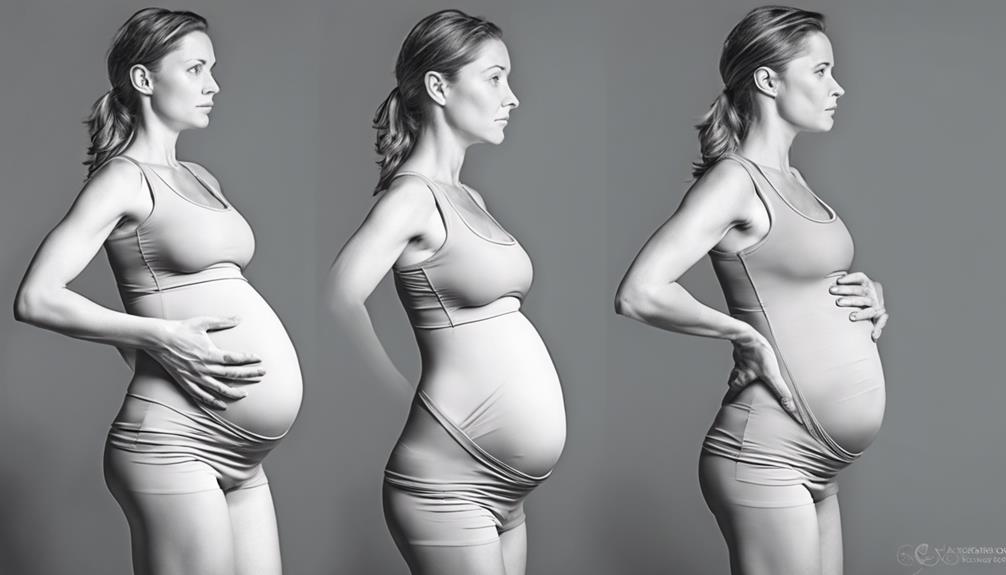
Strengthening core muscles plays an essential role in maintaining balance and stability throughout the third trimester of pregnancy. Engaging in pelvic tilt exercises can effectively strengthen core muscle groups, providing increased support to the spine and pelvis. This added strength not only enhances postural stability but also reduces the risk of falls and injuries.
Leg lift exercises are particularly beneficial during this time as they target core, back, stomach, and buttocks muscles, aiding in toning and overall support. Additionally, incorporating flexibility exercises like backward stretches and upper body rotations can further improve postural stability.
Stay Hydrated

Staying hydrated is important during the third trimester to prevent dizziness and maintain blood pressure levels.
Dehydration can lead to fatigue and increase the risk of falls during pregnancy.
Adequate hydration supports proper circulation, helping to maintain balance and coordination.
Water Intake Importance
Ensuring proper hydration during pregnancy is essential for maintaining amniotic fluid levels and supporting overall maternal health. Here are some key reasons why staying hydrated is important for a healthy pregnancy:
- Preventing Dizziness: Proper water intake can help reduce the risk of dizziness, especially in the third trimester.
- Avoiding Urinary Tract Infections: Adequate hydration can lower the chances of developing urinary tract infections, benefiting both the mother and the baby.
- Supporting Maternal Health: Hydration plays a crucial role in preventing issues like constipation and preterm labor.
- Regulating Body Temperature: Drinking enough water helps regulate body temperature, keeping both the mother and the baby comfortable.
- Promoting Fetal Development: Adequate water intake is important for proper nutrient transport and optimal fetal development.
Hydration Tips for Safety
To maintain excellent health and safety during the third trimester of pregnancy, it is important to prioritize hydration with at least 8-10 cups of water daily. Dehydration can lead to reduced amniotic fluid levels, affecting fetal well-being. Signs of dehydration such as dark urine, dry mouth, fatigue, and dizziness can impact balance, increasing the risk of falls. Proper hydration supports energy levels and helps prevent dizziness, ensuring you stay steady on your feet. Here are some hydration tips for safety:
| Hydration Tips | Benefits |
|---|---|
| Drink water regularly | Prevent dizziness |
| Carry a water bottle | Maintain energy levels |
| Monitor urine color | Guarantee adequate hydration |
| Snack on hydrating fruits | Support fluid intake |
| Avoid caffeine | Opt for water-rich drinks |
Seek Assistance

Upon experiencing a fall during the third trimester, it's essential to promptly seek assistance from medical professionals to safeguard the well-being of both yourself and your baby. Contacting your healthcare provider after a fall can help address any concerning symptoms and make sure a thorough evaluation and monitoring process to detect potential complications that may arise. Seeking medical assistance promptly enables necessary interventions and treatments to protect your health and your baby's well-being. Your healthcare team will assess the impact of the fall on your pregnancy and provide appropriate care to address any issues that may arise.
Remember, your well-being and that of your baby are of utmost importance, and seeking assistance promptly is critical in making sure a safe and healthy pregnancy.
- Contact your healthcare provider for any concerning symptoms
- Make sure prompt evaluation and monitoring
- Detect potential complications early on
- Receive necessary interventions and treatments
- Trust your healthcare team to provide appropriate care
Mind Your Surroundings

After seeking assistance following a fall in the third trimester, maintaining awareness of your surroundings becomes important to make sure a safe and stable environment during pregnancy. To reduce the risk of falling, it's essential to mind your surroundings carefully. Avoiding slippery surfaces and paying attention to potential obstacles that could lead to a loss of balance are key steps.
When moving through stairs, using handrails or other forms of support can greatly enhance stability and prevent accidents. Choosing appropriate footwear with good grip is also important to improve traction while walking, reducing the chances of slipping. By staying focused and mindful of your movements, you can further enhance stability and balance, ensuring a safer experience during the third trimester of pregnancy.
Practice Relaxation Techniques
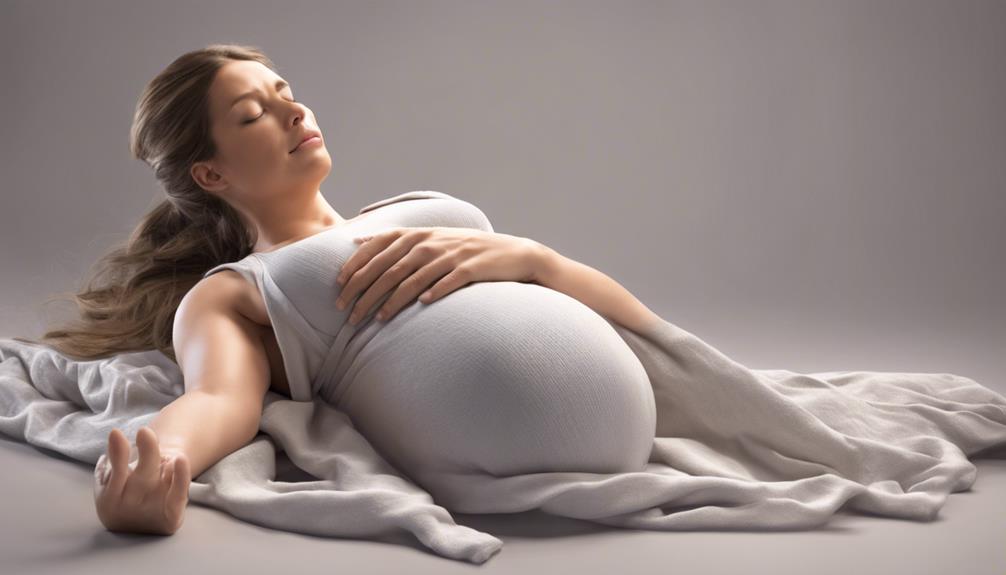
Practicing relaxation techniques regularly can greatly reduce stress and anxiety levels for pregnant women in the third trimester. As expectant mothers ourselves, we empathize with the importance of finding moments of calm amidst the physical and emotional changes we experience. Here are some effective relaxation techniques to help you navigate the challenges of the third trimester:
- Deep Breathing Exercises: Inhale deeply through your nose, hold for a few seconds, and exhale slowly through your mouth to promote relaxation and reduce tension.
- Meditation: Take a few minutes each day to sit quietly, focus on your breath, and cultivate mindfulness to enhance emotional well-being.
- Progressive Muscle Relaxation: Tense and then relax different muscle groups in your body to release physical tension and encourage better sleep.
- Guided Imagery or Visualization: Picture peaceful scenes or scenarios to create a sense of tranquility and relaxation in your mind.
- Mindfulness Practices: Stay present in the moment, acknowledge your feelings without judgment, and embrace self-compassion to alleviate stress and anxiety.
Frequently Asked Questions
What to Do if You Fall in Your Third Trimester?
If we fall in the third trimester, seeking immediate medical attention is vital to assess for any complications. Monitoring fetal movements and informing our healthcare provider are essential steps to guarantee the baby's well-being.
What Happens if I Fall on My Bottom While Pregnant?
If we stumble on our bottom while pregnant, it's important to monitor for any unusual symptoms like contractions or bleeding. Our body protects the baby, but seek medical help if there's severe pain, fluid leakage, or decreased movements.
What Positions Should You Avoid in the Third Trimester?
In the third trimester, we should avoid lying on our back for long periods, deep squats or lunges, heavy lifting, prolonged standing, and sleeping on our back. Prioritizing comfort and safety is important for a healthy pregnancy.
How Can a Fall Affect a Baby?
How does a fall affect a baby? Falls in the third trimester can lead to risks for the baby. Maternal trauma severity impacts fetal injuries. Immediate medical evaluation is vital to assess any potential harm.
Conclusion
We comprehend that falling during pregnancy can be scary, but with the right precautions, you can protect yourself and your baby.
Remember, it's better to be safe than sorry. By following these tips and staying mindful of your surroundings, you can reduce the risk of injury and enjoy a safer third trimester.
Your well-being is our top priority, so don't hesitate to reach out to your healthcare provider for personalized advice and support.
Stay safe and take care!


